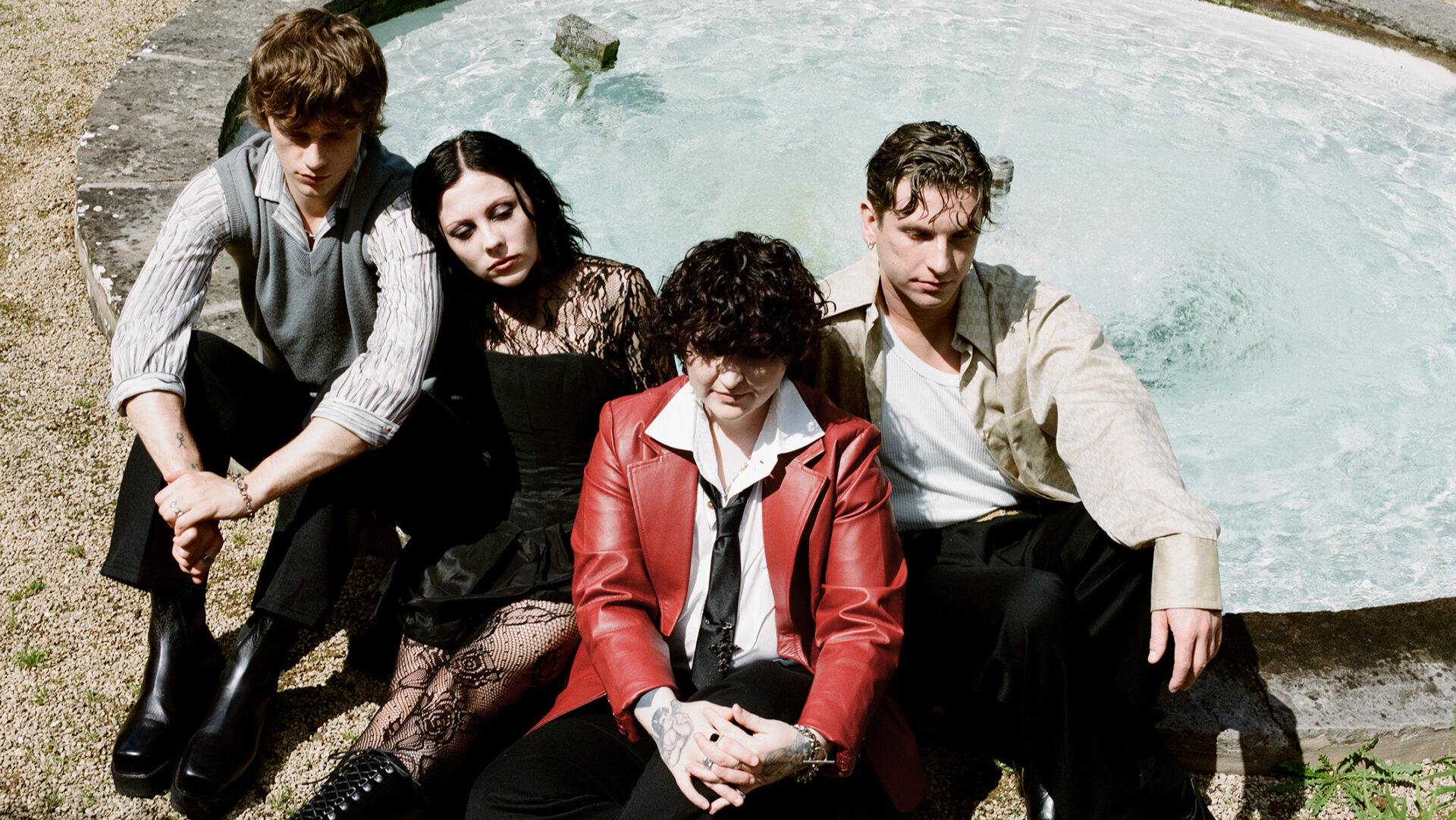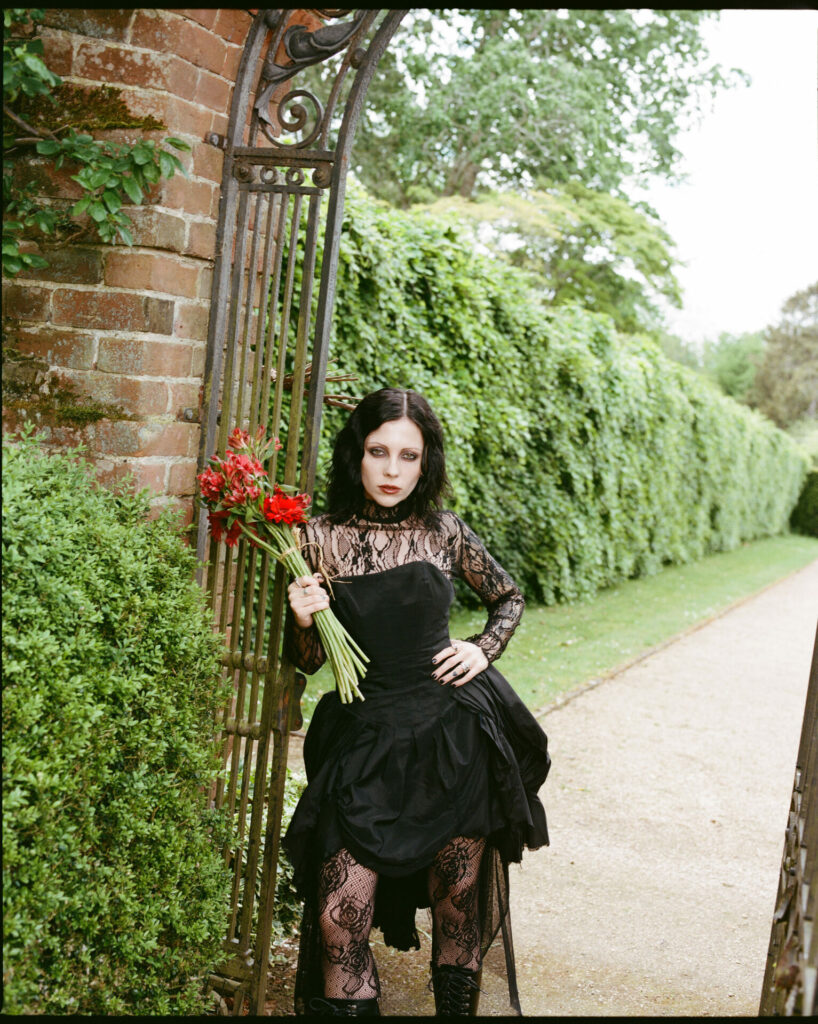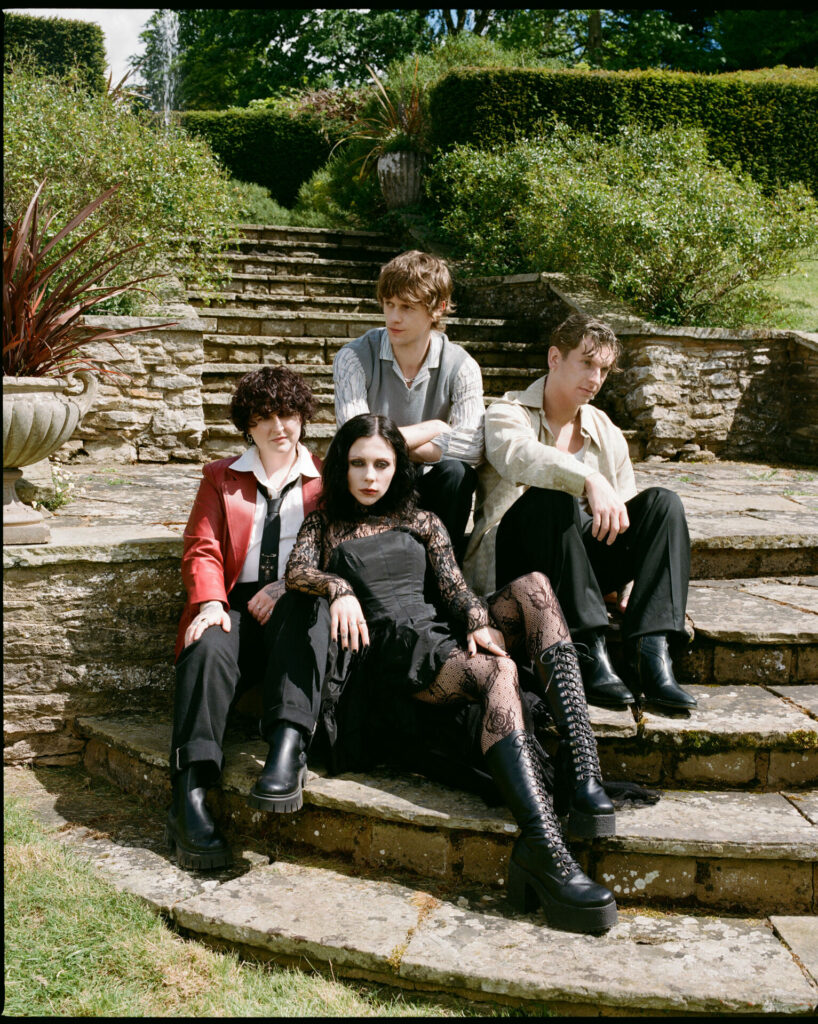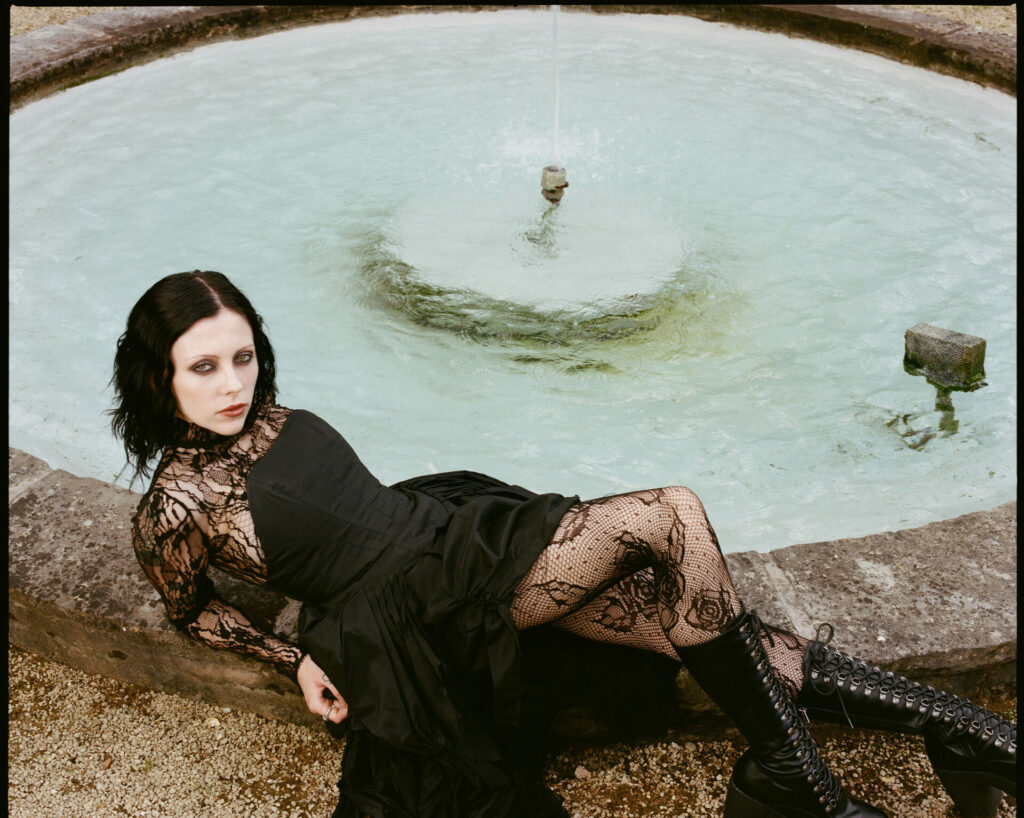Pale Waves: a new wave
Heather Baron-Gracie is celebrating freedom and relishing being part of a movement of queer women in music who are stepping into their power

Recently, Heather Baron-Gracie had a brush with an irate farmer. She had assembled a guerilla crew of only five people to shoot two music videos in two days, in support of her band Pale Waves’ upcoming new album, Smitten. In order to channel the bucolic, English countryside feel she had landed on for the album’s visuals, she decided to film in Lancashire, near where she’s from, and where her parents still live. She can tell you the rest: “We’re 20 minutes away from my parents’ house,” explains Baron-Gracie, sounding incredulous, like a friend sending you a voice note about something wild that just happened to her in Sainsbury’s. “We’re in a field. It’s literally all open fields. Me and my girlfriend Kelsi [Luck, the director and photographer] scouted all the locations beforehand. There was a gate that was open and a sign that said, ‘You can walk here.’ And we’re mid-take on a single-shot video – and we hear this shotgun go off.”
She quietens, “And we were like, ‘What the fuck was that? We’re in England right now – this shouldn’t be happening!’ And then we turn around, and there’s this car at the top of this hill. Everyone’s like, ‘Just go again – it’s fine!’ But we decided to wait 10 minutes, and all of a sudden, this car comes speeding over, and it’s a farmer. He must have been drunk or something, and he’s like,” – Baron-Gracie raises her voice again, contorting it into a comical, Peter Kay-style impersonation, “‘What’s going on here then?’
“And I say, ‘Oh, we’re shooting a music video!’ And he’s like, ‘No, you’re fucking not. Did you not just hear my shotgun? I could have shot you. You need to get off this field right now.’
“So,” Baron-Gracie concludes, “I guess we were on his field. But we got a good take, thank God.”
It’s a funny story, obviously, but it’s also one that feels pertinent to a discussion about Smitten, which is Pale Waves’ fourth full-length record, due for release later this year. Smitten is a shimmering album that sparkles with romance and femininity and, to be honest, more maturity and confidence than the band have previously shown. For Baron-Gracie, who is proudly gay, it is also “a very queer album – arguably our most queer”. It sounds like it was written by someone who, having spent a long time figuring out who she is, has finally reached an answer.
Smitten’s production is full and warm, calling on synths and guitars that make you think of British bands of the 1980s, like The Cure and The Sundays and Cocteau Twins. This is a slight departure for a group who are probably most well-known for a darker aesthetic and a slightly heavier sound, perhaps best described as pop-punk. And to reflect that Britishness, the visual world of the album is all roses and lavender and lace and country houses (“I like to imagine / Me and her in the garden / As the flowers start to bloom,” Baron-Gracie sings on the sweet but properly anthemic ‘Gravity’). As such, Baron-Gracie and co’s encounter with the farmer feels like a decent allegory for the band’s full-throated queering of that traditional English countryside aesthetic – butting heads with the status quo – though, she does give me a bit of a disclaimer: “It’s all very romantic, very dreamy, very English or British. Very cinematic in a way. But then people who’ve seen it say I look like I belong in Twilight.” So far, so Pale Waves.

Today, Baron-Gracie is beamed onto my laptop screen from a place that couldn’t be further from the country. She’s sitting in a non-descript hotel next to Heathrow Airport, having spent the weekend playing Slam Dunk festival. The band will soon embark on a six-week tour of the US, in a support slot for PVRIS – though Baron-Gracie remains every inch the off-duty front person.
Her hair is currently black, and she’s wearing a black hoodie to match, plus the type of rectangular reading glasses that, 10 years ago, were reserved only for geography teachers and Nick Hewer from The Apprentice,but which Gen Z and the fashion elite have now taken to their collective bosom. It’s a very effortlessly cool fit, and it makes me think of archive photos I see of Shirley Manson in an airport or Björk using a PC on Instagram accounts with names like “90scocaine” or “vintagevanity” and so on.
It’s inevitable that Baron-Gracie looks the part because she’s been doing this for so long. Despite being relatively young – 29 – she and Pale Waves have been in the game for quite a while. Alongside drummer Ciara Doran, guitarist Hugo Silvani and bassist Charlie Wood, she signed to probably the UK’s best-known mainstream rock label, Dirty Hit (alongside The 1975, Beabadoobee, The Japanese House and more) in 2017, and the band’s first album, My Mind Makes Noises,was released the following year.
They’ve cycled through a few sonic and aesthetic iterations since. When they first emerged, they presented kind of like the Coronation Street goths if they had a precocious grasp on how to write a chorus that will absolutely not leave your head, while musically, they were concerned with jaunty, upbeat guitar-pop, as their debut attests.
Then 2021’s Who Am I? saw them move into alt-rock, inspired by 90s singer-songwriters like Michelle Branch, Liz Phair and Alanis Morissette, while Unwanted (2022) came in hot with burlier riffs – think Sum 41 and early Paramore. The band have always been uncannily expert at referencing and skating through genres, but Smitten, which borrows something from all of their previous albums to create something new, feels the most like they have arrived at their own solid identity.
Over the course of our interview, the word that Baron-Gracie keeps repeating in relation to the album is “freedom” – that is, from “internal or external influences”, the freedom that comes with getting older, the freedom of time to spare, and the freedom granted to the band by Smitten’s producer Iain Berryman (Wolf Alice, Beabadoobee), with whom they recorded in Eastbourne. It was this freedom that felt especially new, and that seems to have enabled the band to create their best work yet.
Baron-Gracie would tend to agree. Looking back now, she explains that during the making of each of the band’s first three records, there was always something hemming her in. “With the first album, there’s always so much pressure, and yet you have no experience. We’d never been into a recording studio, we were still children, or we felt like it. And we didn’t have a ton of confidence,” she says.
“For the second album, it was more the pressure of: ‘Well, what do we do now? Do we just write the same record as we did the first time around?’ And I kind of wanted to do that 90s, 2000s thing. Then, with Unwanted, that was really written with the intention of coming out with fun songs to play live because obviously we were in lockdown for God knows how long, and we were desperate to play live again. I wanted to make sure that the songs were fun, energetic, bold. And then when Smitten started to happen, I didn’t really have any of those influences or those thoughts in my head. It was just what we loved and what felt natural.”
That’s not to say, however, that the band’s former guises don’t show up a lot here. The starry-eyed optimism of their early singles is all over these songs – you can hear ‘The Tide’ in the brightness of ‘Perfume’ and ‘Glasgow’ – while the Y2K rock chops of Who Am I? and Unwanted are audible on tracks like ‘Seeing Stars’, ‘Kiss Me Again’ and ‘Miss America’. (“It’s almost like you could take any of those tracks and put it on a movie and it would make a great soundtrack,” Baron-Gracie says of the band’s ongoing love affair with the sounds of this era.)

Smitten, then, is the best of Pale Waves. “It’s got parts of every single one [of our albums],” reflects Baron-Gracie. “Even from the first album, we took from that. But it’s not throwing it back, it’s kind of asking, ‘Well, how would that fit Pale Waves now?’ And I feel like you can tell that we’re older in this music. It feels more mature and confident and refined.”
In order to get to this new, grown-up place, however, Baron-Gracie had to go back in time, as a bit of an exercise in self-acceptance. She went back to “writing music for the reason why I picked up a guitar when I was 10 years old,” she says. “And that’s because I loved playing guitar with my dad, and I loved singing.” Vocally, she references “a lot of music that I grew up listening to, like The Cranberries, Garbage, a lot of females. I really took influence from Dolores [O’Riordan] from The Cranberries and Shirley Manson from Garbage in terms of my vocals. I love how they have such unique voices, and they don’t try to mould it to anything else.”
Baron-Gracie also found herself compelled to write about her past experiences, whereas previously, she’d always drawn on the present. “I found myself writing about stuff that happened years ago, when I was 19 or 20,” she says. “At the time, I really started to watch a lot of queer movies and read more queer poetry and books” – she cites classic lesbian novels like Tipping the Velvet and Oranges Are Not the Only Fruit, as well as films like The Handmaiden and Portrait of a Lady on Fire – “and that unlocked all these previous experiences that I’ve had with women, and it just started rolling out of me.
“It kind of became an album that was a reflection of all those interactions and experiences, and moments of me figuring out my sexuality, and also moments of me being with another woman figuring out her sexuality.”
It feels significant, too, that Pale Waves’ self-described “queerest” album is emerging into a musical landscape that has never been more fertile for explicitly lesbian pop and rock music. While a wave has been building in the mainstream for a while – courtesy of acts like MUNA, boygenius, The Japanese House and others – 2024 feels specifically like a breakthrough moment. This year alone we have seen the explosion of the conceptual, drag-inspired fantasy of Chappell Roan, Renée Rapp’s coronation as queen of the internet, and arguably the world’s biggest pop star, Billie Eilish, winkingly announcing “I could eat that girl for lunch” and telling Rolling Stone US: “Last year, I realised I wanted my face in a vagina.” It has been, to borrow a phrase from Roan, a ‘femininomenon’ of seismic proportions.

Upon the release of Smitten, then, I’d imagine that after many years of pretty forthright queer expression, Pale Waves will find themselves in community with more acts than ever, and Baron-Gracie will undoubtedly have even bigger crowds chanting her gay hooks – like ‘Miss America’s “High or low or up or down / Says she’s gonna love me anyhow” – right back to her. She absolutely cannot wait.
“I’m so excited by it,” she says, her soft voice intensifying with enthusiasm. “It feels like a long time coming. I don’t feel like we’ve really ever had that representation. I was really missing that in my life when I was growing up.
“You want someone who you can turn to and look to, who’s older and has had more experience. And you feel like they represent you in a good way, and I don’t feel like I had that.
“But now it’s just like a wave, and all the women are like, ‘This is my time to shine – step aside everyone else! This is for the queer women, give us our platform – and if you don’t, we’re going to take it anyway!’ It feels amazing to be part of it.” She also highlights UK acts Uninvited and Crawlers as up-and-comers in this space, by way of signalling that the ‘wave’ she mentions shows no signs of stopping.
Right now, however, ahead of Smitten’s arrival, Pale Waves have work to do. On their tour with PVRIS, they’ll begin introducing their long-awaited next phase to audiences, which began earlier this month with the release of ‘Perfume’.
For Baron-Gracie, it’s all a little like a personal victory lap, Smitten’s very existence a marker of the freedom (there’s that word again) she now feels in herself and as a musician. “I feel a lot more confident and comfortable in my own skin,” and the album, she says, in all its exploration and excavation of her own self, is testament to that fact. “I felt so insecure for years and had so much self-hatred. But now I’m just like, ‘Oh you know. I’ve only got one shell, so I’d better love it.’”
